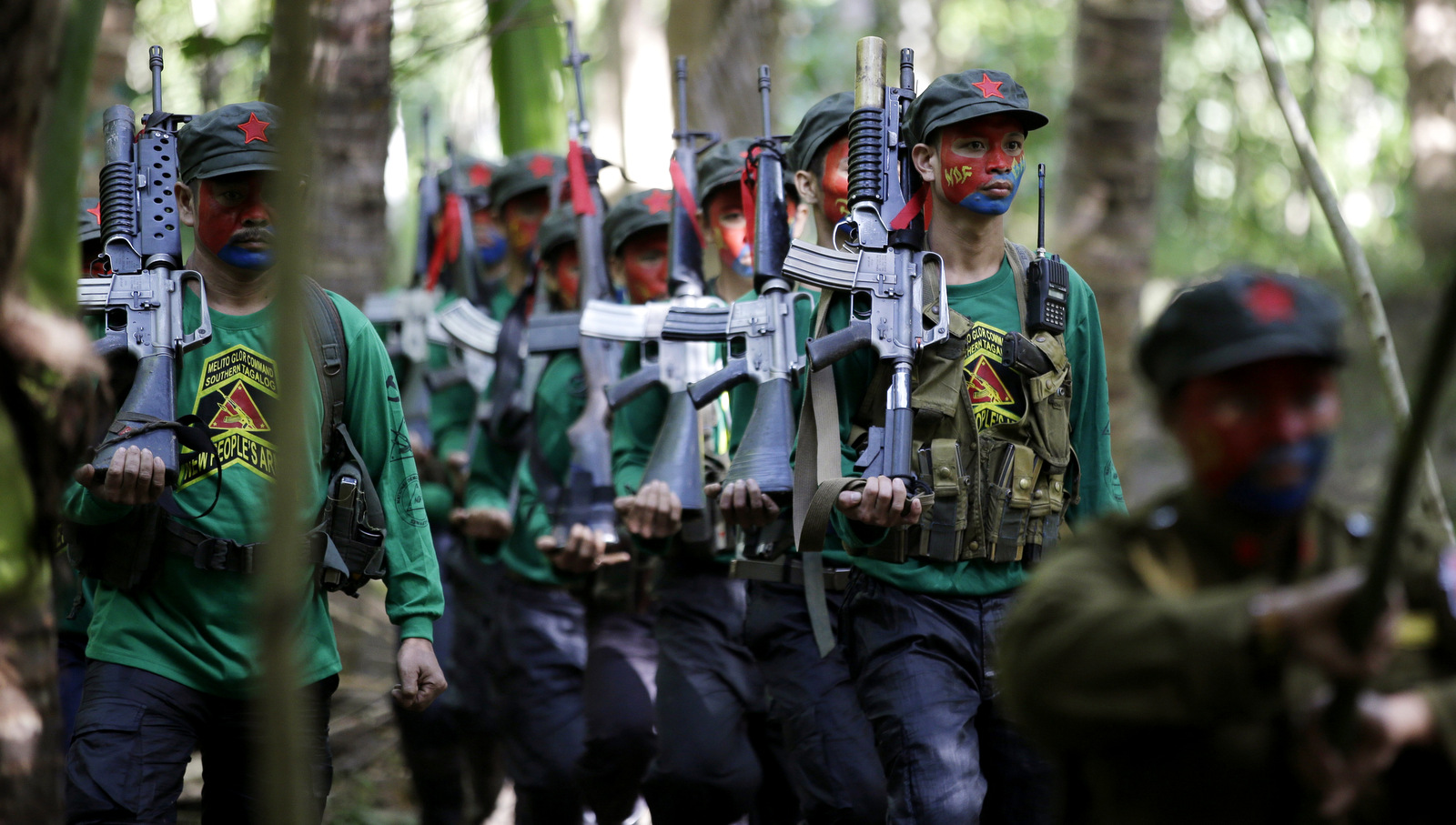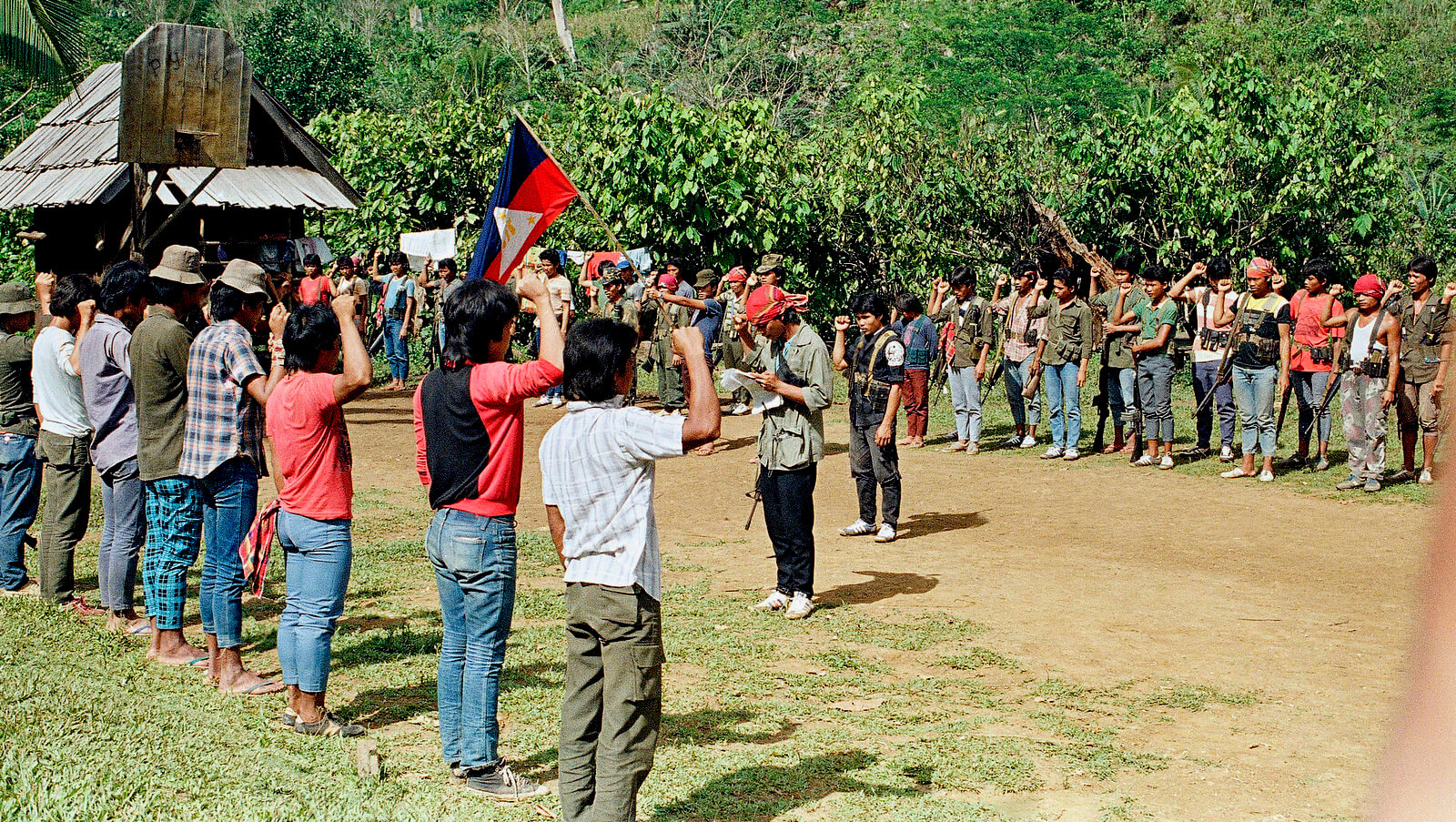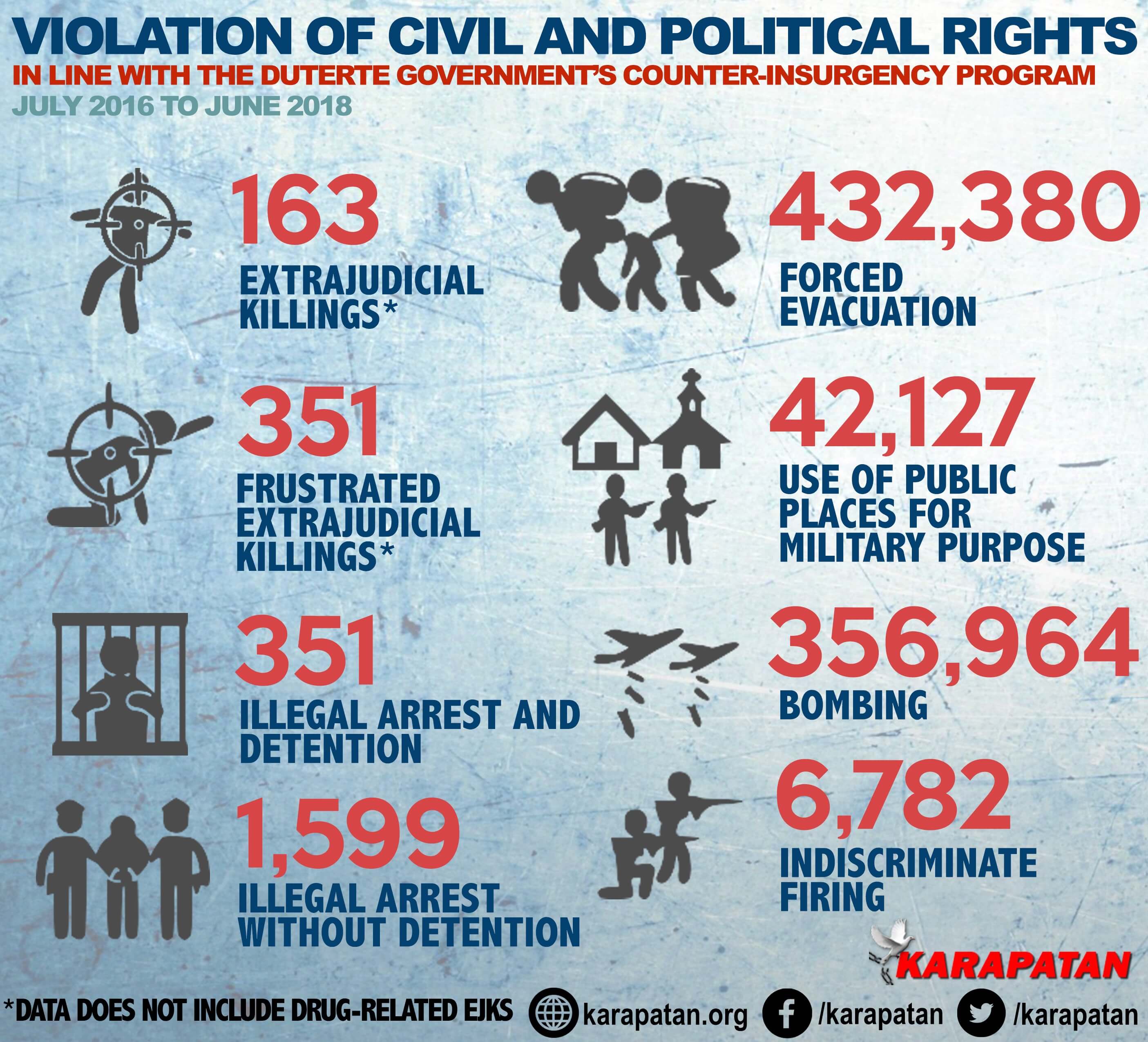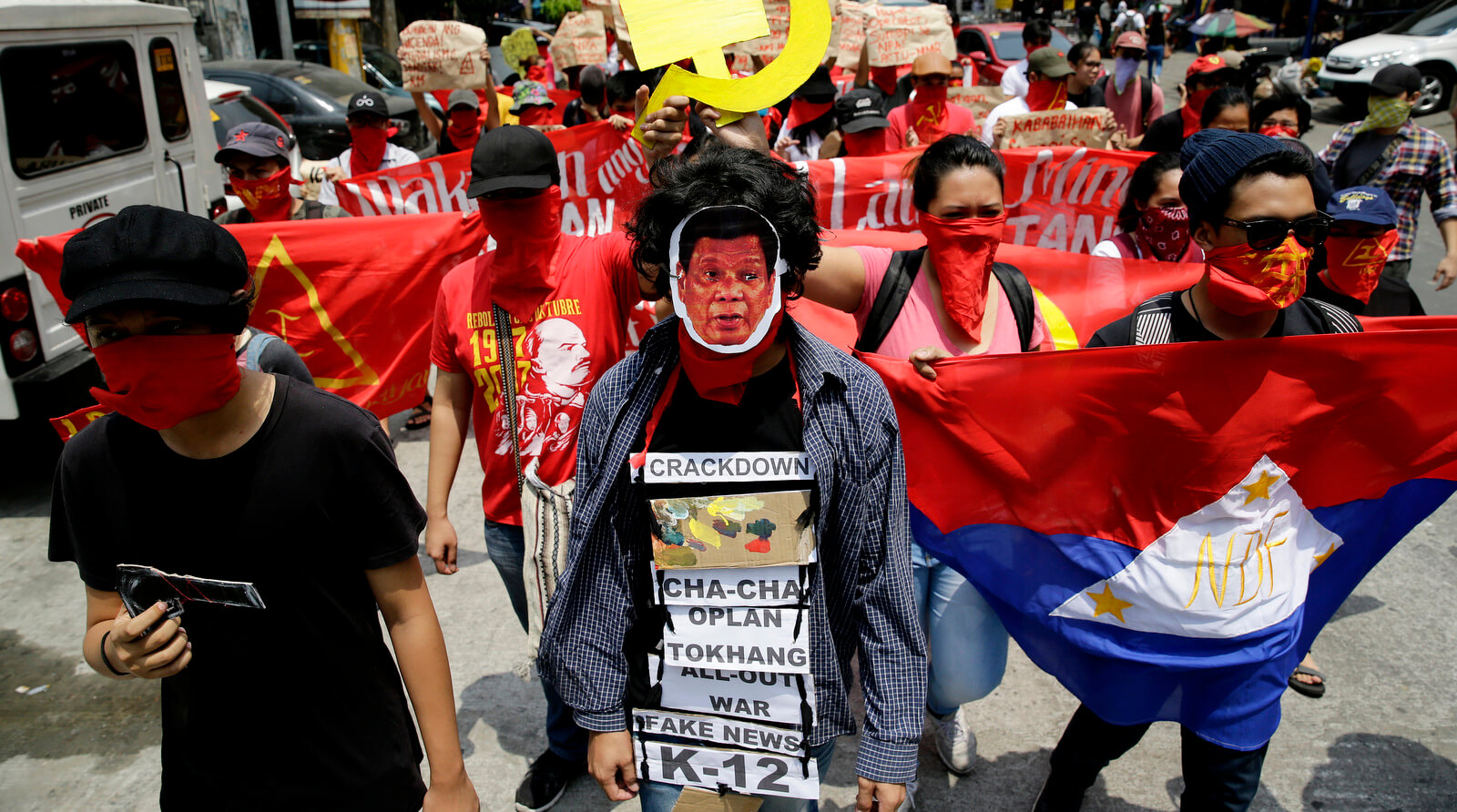DAVAO, PHILIPPINES — The Communist Party of the Philippines (CPP) has roundly rejected President Rodrigo Duterte’s set of stringent conditions for the continuation of peace talks with the Government of the Republic of the Philippines (GRP), blasting Manila’s intransigence and accusing it of seeking to drive “another nail to completely shut down” the process while making it appear that the communists are the ones who are blocking the path forward to peace.
For nearly 50 years the party, which is outlawed in the Philippines, has been waging Asia’s longest-running communist insurgency through its armed wing, the New People’s Army (NPA), as well as engaging in base-building efforts throughout the archipelago that have been spearheaded by the dozens of mass movements, workers’ and peasants’ unions, indigenous peoples’ groups and student organizations belonging to the revolutionary united front, the National Democratic Front (NDFP).
On Thursday, Presidential Adviser on the Peace Process Secretary Jesus Dureza claimed that the door to peace talks would remain open but the Left must conform to a long list of new conditions set out by the Duterte government, most of which have long been rejected by the CPP on various occasions.
In a statement sent to MintPress News early Thursday, the CPP Information Bureau said:
[Manila’s] claim today that Duterte’s doors for resuming peace talks with the NDFP [the National Democratic of the Philippines] ‘are still open’ is an outright lie. This is a desperate PR stunt to obscure the fact that the GRP has repeatedly terminated the talks and make it appear that it is the NDFP which closed its doors.”
Among the new conditions is the demand that the NPA confine themselves to designated encampments, cease armed activities and the collection of the “revolutionary tax” from private industrial and agricultural employers and corporations, and drop the long-negotiated demand for a coalition government.
Watch | Inside the New People’s Army Part 1
The new conditions also include the relocation of peace talks to the Philippines from their current venue in Oslo, Norway, which would pose the danger that the negotiators would be detained, incarcerated, or simply murdered. Most of the negotiators are veteran communist leaders who fled to Europe to avoid the repression and torture they faced under previous Philippine governments, such as the dictatorship of the U.S.-backed President Ferdinand Marcos.
The fifth round of peace talks has been stalled since last November, and has been cancelled three times since then – most recently last June, when the resumption of talks was abruptly scrapped, surprising even the government peace negotiators who have been negotiating with the Left’s representatives in Oslo..
The Information Bureau added:
[Duterte] knows fully well that the demand to hold talks in the Philippines is unacceptable and unworkable for the NDFP (National Democratic People’s Front), unless he thinks the NDFP will be negotiating only to surrender the Filipino people’s aspirations and give up all its revolutionary principles.”
For years, the NDFP has represented the broad left alliance in peace talks with the Manila government.
“To impose such preconditions on the NDFP is tantamount to demanding its capitulation or surrender, and therefore unacceptable,” Philippine Peace Center executive director and NDFP consultant Rey Claro Casambre said, noting that the imposition of such preconditions “show utter ignorance, if not high-handed arrogance, in the conduct of peace negotiations.” He added:
The result of all [this] ignorance and arrogance is that not only the GRP but the entire Filipino people are being deprived a useful venue for addressing and resolving the roots of the armed conflict.”
The CPP also derided Duterte’s various claims of a vast conspiracy involving everyone from Catholic and Christian clergy to leftist activists as a means to repress growing demands for rights across the country and to prepare the Philippines for the broadening of martial law or a general crackdown that would happen by this October. The party stated:
Having cancelled peace talks with the NDFP, the Department of Justice (DOJ) is now rushing its proscription petition against the CPP and the NPA, which accuses activists, human rights advocates, indigenous people’s leaders and other political personalities of being leaders of the CPP and NPA … This petition aims to strike fear against the growing anti-fascist movement and stifle the burgeoning workers’ strikes and protests. To tag legal activists and critics as terrorists is a desperate attempt to quell the masses’ growing dissent and discontent.”
Who are the Philippine communists and red insurgents?

The Communist Party of the Philippines was re-founded on the basis of Marxist-Leninist-Mao Zedong thought on December 26, 1968, following the decline and stagnation of the Moscow-backed communist party founded in 1930. This happened amid the immense hostility between the People’s Republic of China and the Soviet Union, as well as the beginning of the Cultural Revolution in China.
With an aim toward rekindling the country’s long history of national liberation struggles and effectively combating the repressive presidency of Ferdinand Marcos, the young Jose Maria Sison – then known by his alias, Amado Guerrero – formed the new party to begin what the group calls the “new-democratic revolution.”
Months later on March 29, 1969, the party formed the New People’s Army (NPA) with an embryonic group comprised of “60 fighters, armed with nine automatic rifles and 26 single-shot rifles and handguns in the second district of Tarlac province,” according to Sison, who was also the young Rodrigo Duterte’s former college instructor.
Watch | Why is there an armed revolution in the Philippines?
The party rapidly grew, compelling Marcos to declare martial law on Sept. 21, 1972, and assume the position of dictator. This not only opened the floodgates to widespread torture, repression and counter-insurgency against civilian communities, but also to the rapid expansion of the party and its revolutionary people’s army.
Following the kleptocratic dictator’s fall, the Manila government began a process of intermittent peace talks with the clandestine party in 1986. Since then, there have been a series of zig-zags by the country’s successive presidential administrations, which have led to the current impasse.

Members of the Philippine left believe that this history shows how attacks waged by the “U.S.-Duterte regime” against poor and exploited communities in the country will mean that by relentlessly repressing the people, like Marcos, the Philippine strongman could inadvertently be a top recruiter for the CPP-NPA.
Duterte, an initial supporter of the peace process and the Left’s proposed ambitious socio-economic reform agenda, derailed the negotiations last May following his declaration of martial law in Mindanao. He has promised to wipe out the communist insurgency, going so far as to dub the CPP-NPA-NDF “terrorists” and “co-conspirators of terrorism,” yet the party remains deeply dug-in across the country, with dozens of base areas on all major islands in the archipelago.
On Wednesday, July 4, the CPP marked Philippine Republic Day — a day seen as celebrating the brutal colonization of the archipelago by the U.S. imperialists and its commission of genocide against the people — with a statement slamming the anti-poor policies of the “U.S.-Duterte regime”:
More than seven decades after the U.S. colonial regime granted nominal independence to the Philippines on July 4, 1946 and handed over the reins of government to its U.S.-indoctrinated politicians and technocrats, the country remains under U.S. neocolonial stranglehold. Burdened primarily by U.S. semicolonial yoke, the Philippines remains economically dependent, politically subservient, culturally subjugated and militarily bound to the U.S.
Rodrigo Duterte is the current chief of this neocolonial state. Over the past two years, he has perpetuated U.S. neocolonial rule in the country. Despite his anti-American histrionics, dramatic declarations of an “independent foreign policy,” and theatrics of “shifting to China and Russia” early in his term, he has proved himself no different from previous puppet presidents since 1946 who all have steadfastly defended U.S. semicolonial rule.
The U.S.-Duterte regime is the current expression of U.S. neocolonial rule in the Philippines and of the subservience of the ruling political elite. His cabinet is composed of stalwarts of U.S. hegemonism. His economic managers are IMF and World Bank-trained experts and champions of the neoliberal policy regime. His defense and security officials are pro-American zealots of U.S. counterinsurgency doctrine.
Manila offers “localized peace talks;” communists say “keep dreaming”
The Malacañang Presidential Palace has, however, offered to hold “localized peace talks” with individual CPP-NPA units in hopes to sidestep founding CPP chairman and NDFP Chief Political Consultant Jose Maria Sison, who holds no formal role in the CPP and NPA and also lives in exile.
Philippine Defense Secretary Delfin Lorenzana believes the localized approach can succeed, because, by avoiding the 79-year-old veteran leader, « true peace will have a chance to become a reality and [Sison] will be consigned to the dustbin of history. »
Watch | Inside the New People’s Army Part 2
The party, however, rejected the offer in 2017 and blasted it as a simple-minded proposal that indicates a « very shallow appreciation of the profound social problems which are at the root of the raging civil war in the Philippines. »
In their statement, the CPP indicated that such offers ignore the organized nature of the Left, which isn’t so vulnerable to the “extreme foolishness” indicated by the government’s divide-and-conquer schemes:
All units of the NPA and committees of the CPP are united under the central leadership of the Party. The Party and NPA fully support the Negotiating Panel of the NDFP in its representation of all revolutionary forces in negotiations with the Government of the Republic of the Philippines.”
The so-called localized peace talks – which would essentially require that units of the communist guerilla force abandon and defect from basic party discipline and NPA ranks – would “only seek to obscure the ruthlessness and brutality of the all-out military offensives of the AFP [Armed Forces of the Philippines],” the party added:
Under Oplan Kapayapaan [Operational Plan ‘Double Barrel’], the AFP is mounting all-out offensives and laying siege on hundreds of barrios, carrying out aerial bombardments and perpetrating extrajudicial killings ala Tokhang [‘Door Knock’ or Duterte’s drug war], and other grave abuses against the peasants, national minorities and other oppressed peoples.”

Duterte presses on with war and terror as a solution to the war
Late last month, an operation by the Philippine military failed spectacularly when the AFP and a group of police officers exchanged fire in the middle of the jungle. The AFP had apparently mistaken the officers as NPA guerillas before opening fire, killing six officers and wounding nine in the operation that army brass described as an “unfortunate incident.” There were no casualties among the soldiers.
In a statement by KARAPATAN Alliance for the Advancement of People’s Rights, the leftist human-rights monitoring group derided the so-called “road to peace” as an all-out war and waging of state terror on the Filipino people:
By all indications, Duterte and his hordes of militarists … are the main obstacles in the Filipino people’s quest for a just and lasting peace. When the government’s only solution to armed conflict and social unrest is all-out war, what usually results is a human and people’s rights catastrophe.
Indeed, Duterte and his administration remain as the biggest purveyor of State terrorism and violence. As always and now more than ever, it is incumbent on the Filipino people to fight for just and lasting peace.”
Top Photo | A protester from the outlawed « Kabataang Makabayan, » Patriotic Youths group, wears a mask showing the face of Philippine President Rodrigo Duterte during a rally to commemorate the 49th anniversary of the New People’s Army, the armed wing of the Communist Party of the Philippines, near the Malacanang presidential palace in Manila, Philippines, March 21, 2018. Aaron Favila | AP
Elliott Gabriel is a former staff writer for teleSUR English and a MintPress News contributor based in Quito, Ecuador. He has taken extensive part in advocacy and organizing in the pro-labor, migrant justice and police accountability movements of Southern California and the state’s Central Coast.


